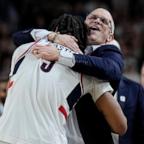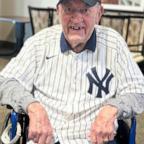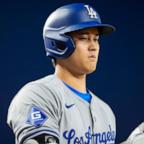NBA, NCAA, players association align as step toward one-and-done rule elimination
In a significant step toward the elimination of the one-and-done rule, basketball's biggest stakeholders have come together to make an unprecedented agreement that will allow the NBA to begin formally working with the nation's top teenagers to help prepare them for pro careers.
The NBA, NCAA and National Basketball Players Association announced Wednesday they have come together to extend their support of USA Basketball and its Junior National Team.
USA Basketball has identified top young players for decades and brought them together to train for international competitions. Now the program will be extended to approximately 80 players, or about 20 per high school class, and the NBA will provide health and wellness training, as well as assisting in other developmental programs. The series of training camps and competitions will begin in October at USA Basketball's headquarters in Colorado Springs, Colorado.
It's the first time these four parties have formally aligned and combined their resources toward a common goal. And unlike earlier this month when the NCAA rolled out changes to its eligibility rules that would allow some college players to sign with agents -- an announcement that caught the NBA and USA Basketball by surprise -- all of the groups are on the same page for this important step.
The expanded program will provide doctors, athletic trainers and experts in health and performance year-round to the players and be led by longtime Boston Celtics athletic trainer Ed Lacerte. Once fully operational, not only will it improve training and care but will give NBA officials and teams the chance to work with and evaluate players for several years before they enter draft eligibility.
The Rice Commission on College Basketball has recommended the NBA's age limit be abolished. NBA commissioner Adam Silver has targeted either the 2021 or 2022 draft for doing so, which would coincide with the first graduating classes of this new program.
Currently, players leaving high school have the option of entering the G League for a year if they want to immediately turn pro. This new system would allow NBA teams to touch players who choose that path as well.
Related Stories
"We've been looking to get more involved in elite youth basketball for several years," said Kathy Behrens, the NBA's president for social responsibility and player programs. "We really have a sense of urgency around it. This is exactly what we've been saying we need to do."
The NBA studied at length how to begin preparing for the changing of the age limit, examining a number of different avenues to determine where to get involved. The league is taking it slow, trying to prevent and correct mistakes that forced the adoption of the age limit in 2005. While it could've started its own operation, ultimately the NBA decided to work together with the NCAA and USA Basketball, groups that have experience working with the country's most talented teens.
"Youth basketball has changed dramatically over the last 20 years," said USA Basketball chairman Gen. Martin Dempsey. "These are four big institutions and each of us bring something a little different. We all have a responsibility to get these young men ready."
To that end, the elite young players will also receive life skills training on a variety of topics from positive decision-making to navigating the college recruitment process. Also for the first time, there will be sessions for parents and guardians to prepare them for the process of their sons playing basketball at the highest levels.
The players' union and the NBA, which already have these sorts of training programs in place for rookies and players within the league, will lead that effort. The NBA and NCAA are also expected to eventually loosen some of their rules about pro coaches having contact with amateur players so there are no eligibility issues for those on the junior national team.
"It's a natural fit to take the excellent life skills instruction and off-court development programs we provide for NBA players and stretch them out so that we can provide support and guidance to young, developing talent," NBPA executive director Michele Roberts said in a statement. "This is an effort that is long overdue."



